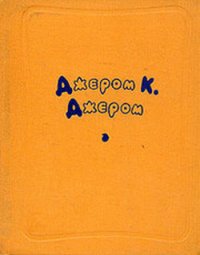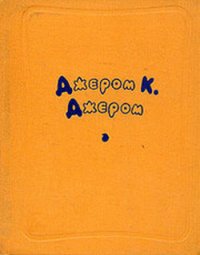My First Book - Jerome Jerome Klapka (читать книги онлайн полностью без регистрации .TXT) 📗
Be this as it may, I sent the manuscript of 'The Wreck of the "Grosvenor"' to my old friend Edward Marston, of the firm of Sampson Low & Co. The firm offered me fifty pounds for it; I took the money and signed the agreement, in which I disposed of all rights. Do I murmur over the recollection of this fifty pounds which, with another ten pounds kindly sent to me by Mr. Marston as the whole of, or a part of, a cheque received from Messrs. Harper & Brothers, was all I ever got for this sea book? Certainly not. The transaction was absolutely fair, and what leaning there was was in my favour. The book was an experiment; it was published anonymously; it might have fallen dead. Happily for publisher and author, the book made its way. I believe it was immediately successful in America, and that its reception there somewhat influenced inquiry here. American critics who try to vex me say that my books never would have been read in this country but for what was said of them in the States, and for the publicity provided for them there by the twenty-cent editions. How far this is true I don't know; but certainly the Yankees are handsomer and prompter in their recognition of what pleases them than we are on our side. What they like they raise a great cry over, and the note of so mighty a concourse, I don't doubt, fetches an echo out of distances below the horizon.

It is many years now since 'The Wreck of the "Grosvenor"' was written, and I do not very clearly recollect its reception in this country. I believe it speedily went into a second edition. But before we talk of an edition seriously we must first learn the number of copies which make it. Since this was written, my friend, Mr. R. B. Marston, of the firm of Sampson Low & Co., has been good enough to look into the sales of 'The Wreck of the "Grosvenor,"' and he informs me that down to 1891 there had been sold 34,950 copies. One of the most cordial welcomes the story received was from Vanity Fair. I supposed that the review was written by the editor, Mr. Thomas Gibson Bowles, until I learnt that the late Mr. James Runciman was the author. The critics on the whole were generous. They thought the book fresh. They judged that it was an original piece of work wrought largely out of the personal experiences of the writer. One gentleman, indeed, said that he had crossed the Channel on several occasions between Boulogne and Folkestone, but had never witnessed such seas as I described; and another that he had frequently travelled to Plymouth on the Great Western Railway in company with sailors, but had never met such seamen as the forecastle hands I depicted. The book is considered my best—this, perhaps, because it was my first, and its reputation lies in the memory and impression of its freshness. It is far from being my best. Were it my property I would re-write it. I had quitted the sea some years when I wrote the story, and here and there my memory played me false; that is to say, in the direction of certain minute technicalities and in accounts of the internal discipline of the ship. Yet, on the whole, the blunders are few considering how very complicated a fabric a vessel is, and how ceaselessly one needs to go on living the life of the sea to hold all parts of it clear to the sight of the mind. Professionally, the influence of the book has been small. I have heard that it made one ship-owner sorry and rather virtuous, and that for some time his harness-casks went their voyages fairly sweet. He is, however, but a solitary figure, the lonesome Crusoe of my little principality of fancy. As a piece of literature, 'The Wreck of the "Grosvenor"' has been occasionally imitated. Mr. Plimsoll, I understand, has lately been dealing with the subject of sailors' food. I heartily wish success to his efforts.

'PHYSIOLOGICAL ?STHETICS' and 'PHILISTIA'
By Grant Allen

THE story of my first book is a good deal mixed, and, like many other stories, cannot be fully understood without some previous allusion to what historians call 'the causes which led to it.' For my first book was not my first novel, and it is the latter, I take it, not the former, that an expectant world, as represented by the readers of this volume, is anxious to hear about. I first blossomed into print with 'Physiological ?sthetics' in 1877—the title alone will be enough for most people—and it was not till seven years later that I wrote and published my earliest long work of fiction, which I called 'Philistia.' I wasn't born a novelist, I was only made one. Philosophy and science were the first loves of my youth. I dropped into romance as many men drop into drink, or opium-eating, or other bad practices, not of native perversity, but by pure force of circumstances. And this is how fate (or an enterprising publisher) turned me from an innocent and impecunious naturalist into a devotee of the muse of shilling shockers.

When I left Oxford in 1870, with a decent degree and nothing much else in particular to brag about, I took perforce to that refuge of the destitute, the trade of schoolmaster. To teach Latin and Greek verse at Brighton College, Cheltenham College, Reading Grammar School, successively, was the extremely uncongenial task imposed upon me by the chances of the universe. But in 1873, Providence, disguised as the Colonial Office, sent me out in charge of a new Government College at Spanish Town, Jamaica. I had always been psychological, and in the space and leisure of the lazy Tropics I began to excogitate by slow degrees various expansive works on the science of mind, the greater number of which still remain unwritten. Returning to England in '76 I found myself out of work, and so committed to paper some of my views on the origin of the higher pleasure we derive from natural or artistic products; and I called my book 'Physiological ?sthetics.' It was not my very first attempt at literature; already I had produced about a hundred or more magazine articles on various philosophical and scientific subjects, every one of which I sent to the editors of leading reviews, and every one of which was punctually 'Declined with thanks,' or committed without even that polite formality to the editorial waste paper basket. Nothing daunted by failure, however, I wrote on and on, and made up my mind, in my interval of forced idleness, to print a book of my own at all hazards.
I wrote 'Physiological ?sthetics' in lodgings at Oxford. When it was finished and carefully revised, I offered it to Messrs. Henry S. King & Co., who were then leading publishers of philosophical literature. Mr. Kegan Paul, their reader, reported doubtfully of the work. It was not likely to pay, he said, but it contained good matter, and the firm would print it for me on the usual commission. I was by no means rich—for fear of exaggeration I am stating the case mildly—but I believed somehow in 'Physiological ?sthetics.' I was young then, and I hope the court of public opinion will extend to me, on that ground, the indulgence usually shown to juvenile offenders. But I happened to possess a little money just at that moment, granted me as compensation for the abolition of my office in Jamaica. Messrs. King reported that the cost of production (that mysterious entity so obnoxious to the soul of the Society of Authors) would amount to about a hundred guineas. A hundred guineas was a lot of money then; but, being young, I risked it. It was better than if I had taken it to Monte Carlo, anyway. So I wrote to Mr. Paul with heedless haste to publish away right off, and he published away right off accordingly. When the bill came in, it was, if I recollect aright, somewhere about 120l. I paid it without a murmur; I got my money's worth. The book appeared in a stately green cover, with my name in front, and looked very philosophical, and learned, and psychological.
1
In this ship, the 'Hougoumont,' I served three years. She was a transport, and was in the China war, 1860-1. Her burden was about 1,000 tons. This picture represents her as a sheer hulk employed in the construction of the Forth Bridge. I saw her towing down Channel in this state in 1889—she drew abreast of my house at Deal—and I could have wept to witness my old floating home in so miserable a condition.—C. R.




